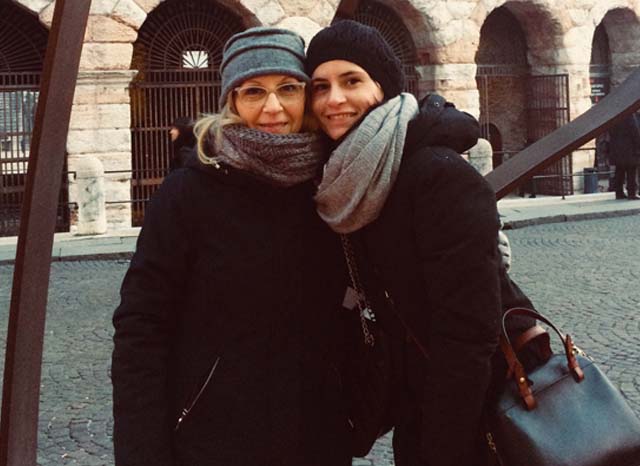
In questo periodo di Covid 19 e quarantena devi lavarti le mani! Davvero, devi lavartele!
In this time of Covid 19 and quarantine you must wash your hands! Really, you must wash them!
Did you understand how the second sentence:
Davvero, devi lavartele!
was put together?
To create the sentence: You must wash them! Devi lavartele! I’m using Double Object Pronouns
Come in inglese, in italiano ci sono molte scorciatoie quando non vuoi ripetere una parola. Queste piccole parole che usiamo di sostituire parole o frase chiamiamo Pronomi Diretti e Pronomi Indiretti.
As in English, in Italian, there are many shortcuts when expressing yourself to keep from repeating words over and over again. These small words that we use to substitute words or phrases we call Direct and Indirect Pronouns

La scorsa settimana stavo chiaccherando con un’amica in Inghilterra e lei aveva alcune domande sui pronomi. Fa Duolingo ed era un po’ confusa su come combinare i pronomi indiretti con i pronomi diretti.
Last week I was chatting with a friend in England and she had some questions about Double Object Pronouns. She’s been working through the Duolingo exercises and was unclear how to combine indirect pronouns together with direct pronouns.
I thought I’d put together a little refresher
tip for Carol and all of you on how to
put together direct and indirect pronouns.
As you become comfortable with the Italian
language you will discover there are shorthand
ways of avoiding repeating words.
Take for example this little dialogue in which
the word “pasta” is used repeatedly.

Did you eat the pasta? Yes, I ate the pasta. The pasta was very good. Did you make the pasta? Can you make the pasta again tomorrow?
Instead, we can shorten it to this — which seems more natural.
Mangi la pasta? Sì, la mangio. È molto buona. L’hai fatta, tu? Puoi rifarla domani?
Are you eating the pasta? Yes, I’m eating it. It is good. Did you make it? Can you make it again tomorrow?
In this instance, we are using the direct pronoun “la” to substitute the word “pasta.”
Direct Pronoun refresher
Remember direct pronouns answer the question what? Or whom?
(mi, ti, lo/la/l’, ci, vi, li/le)
Mangi la pasta? Sì la mangio = (Mangio la pasta)
Hai spedito la lettera? Sì, l’ho spedita = (Ho spedito la lettera)
Avete comprato il pane? No, non l’abbiamo comprato. =
(Non abbiamo comprato il pane).
Indirect Pronoun refresher
Remember indirect pronouns equal the question of to whom? Or for whom?
In Italian, the preposition a is always used before an indirect object noun.
Me (to me), Ti (to you), Le (to her), gli (to him), ci (to us), vi (to you all), gli (to them)
Parlo spesso alle mie amiche italiane. Gli parlo spesso.
I often speak to my Italian friends. I speak to them often.
Lucia non dà la pillola al figlio. Lucia non gli dà la pillola
Lucia doesn’t give the pill to the child. Lucia doesn’t give to him the pill.
Desidero scrivere a lui e a lei. Desidero scrivergli.
I want to write to him and to her. I want to write to them.
Now what happens when
you want to combine
direct and indirect pronouns?
Note that with the exception of gli, all indirect object pronouns (mi, ti, ci, si, vi) replace their final vowel i with an e before any of the direct object pronouns lo, la, li, le and ne. The indirect object pronoun gli instead adds an e, becoming glie, and attaches to it.
For example:
Mi (to mi – Indirect pronoun) + lo, la, li, le, ne (direct pronoun)
= me lo, me la, me li, me le, me ne
Ti (to you – Indirect pronoun)+ lo, la, li, le, ne (direct pronoun)
= te lo, te la, te li, te le, te ne
Le (to her – Indirect pronoun) + lo, la, li, le, ne (direct pronoun)
= glielo, gliela, glieli, gliele, gliene
gli (to him – Indirect pronoun)+ lo, la, li, le, ne (direct pronoun)
= glielo, gliela, gliei, gliele, gliene
ci (to us – Indirect pronoun)+ lo, la, li, le, ne (direct pronoun)
= ce lo, ce la, ce li, ce le, ce ne
vi (to you all – Indirect pronoun)+ lo, la, li, le, ne (direct pronoun)
= ve lo, ve la, ve li, ve le, ve ne
gli (to them – Indirect pronoun)+ lo, la, li, le, ne (direct pronoun)
= glielo, gliela, glieli, gliele, gliene
Examples:
Rita non ci ha detto la verità. = Rita did not tell us the truth.
Rita non ce l’ha detta. = Rita didn’t tell it to us.
È tornato per darti gli assegni. = He came back to give you the checks.
È tornato per darteli. = He came back to give them to you.
And we are back to our first example!
Tu devi lavarti le mani. = You must wash your hands.
Tu devi lavartele. = You must wash them!
Now your turn. Tocca a te!
Here are some exercises for you to try
(after washing your hands of course!)
If you’d like your answers checked,
email me at Melissa@StudentessaMatta.com
- Chi ha dato il mio quaderno al professore?
- Mamma, non fare tante telefonate a Luisa! tip use “ne” in this solution)
- L’insegnante ti ha spiegato I verbi irregolari.
- Compriamo queste scarpe per tua sorella.
- Noi vi diciamo sempre la verità.
- Quella scrittrice ci parlerà del suo nuovo romanzo. (tip use “ne” in this solution)
- Quante lettere avete scritto ai vostri nonni? (tip use “ne” in this solution)
Translate these sentences
- He gave her many flowers for her birthday
- He gave her them (flowers) for her birthday
- I can not tell it to (plural) you until tomorrow.
- They have been talking to them about it for twenty-five minutes. (tip use “ne” in this solution)
Keep safe and keep learning!
If you’d like to schedule a chat with me and work on grammar and conversation I’d love to work with you. To set up a call click here:












Cara Matta,
Sono così felice di aver trovato la tua pagina web! (i’m a beginner and cheated to come up with that sentence, ma e’ vero!) I especially find helpful your short italian entries followed by english – so one can look back and forth as needed w/o losing track of the italian sentence!
Grazie mille, minou
Ciao Minou! Benvvenuto/a! Sono contenta che tu sia qui! Let me know if you have any questions as you begin your Italian language journey! Happy to help in any way! <3